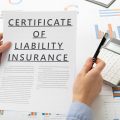eCommerce Business Insurance – Find the Best Protection
Whether you operate in the digital or physical realm, running a business comes with inherent risks. eCommerce insurance becomes particularly crucial in the online sector, which has seen explosive growth, with sales surpassing a staggering $4+ billion in 2020.
Need
eCommerce Insurance ?
Get Your Free Quote
The complexity of managing an e-commerce business often surpasses that of traditional businesses due to the higher number of risks and the legal ambiguities that can arise from online operations. For these reasons, it’s essential to protect your venture with a comprehensive e-commerce insurance policy.
Types of eCommerce Services
In the dynamic world of digital commerce, the range and complexity of eCommerce services continue to evolve, reflecting shifts in consumer behavior, technological advancements, and market demands. From the foundational models that directly connect businesses with consumers, to more specialized platforms facilitating unique transactions, the eCommerce ecosystem is diverse. Understanding the various types of eCommerce services is crucial for businesses looking to navigate this space effectively. Below is a detailed categorization of these services, providing clarity on each model and its role within the broader digital marketplace.
| Type | Description |
|---|---|
| B2C (Business to Consumer) | The most common form of eCommerce, where businesses sell directly to the end consumer. This includes online retailers of clothing, electronics, and more. |
| B2B (Business to Business) | Involves transactions between two businesses, such as manufacturers selling to distributors or wholesalers. This also includes software companies offering solutions to other businesses. |
| C2C (Consumer to Consumer) | Platforms like eBay and Craigslist, where consumers can sell goods and services to other consumers. This model facilitates the resale of goods or the offering of freelance services. |
| C2B (Consumer to Business) | Where individuals sell products or services to businesses. This includes freelance platforms like Upwork, stock photography websites, and influencer marketing. |
| B2A (Business to Administration) and C2A (Consumer to Administration) | These models involve transactions conducted online between companies or individuals and public administrations or government entities. Services include tax filing, procurement, and legal document processing. |
| D2C (Direct to Consumer) | Manufacturers or brands sell directly to consumers, bypassing traditional retailers, wholesalers, and other middlemen. This model has gained popularity with brands looking to build a direct relationship with their customers. |
| B2G (Business to Government) | Similar to B2A but specifically involves selling products or services directly to government agencies or entities. This can include everything from office supplies to large-scale infrastructure projects. |
| eLearning Platforms | These platforms offer educational services directly to learners (B2C) or institutions (B2B). They represent a growing sector within eCommerce, especially with the rise of online education. |
| Subscription Services | This model includes businesses that offer products or services on a subscription basis, ranging from digital content streaming to monthly delivery of consumer goods. |
| Marketplace Lending Platforms | Financial services platforms that connect borrowers with investors directly, bypassing traditional banking and financial institutions. |
Most Significant Risks Faced by E-Commerce Businesses
Fraud
Fraud is perhaps one of the greatest threats to owners of e-commerce businesses.
E-commerce fraud volume has been snowballing in the last few years.
In terms of numbers, e-commerce fraud increased by over 40 percent in 2017, which resulted in losses of more than 50 billion dollars.
E-commerce business fraud is due to several reasons, including stolen or fake credit cards, identity falsification, and many others.
Small Business General Liability Protection:
Get Your Free Quote
Even though security procedures to protect e-commerce have greatly improved, fraud is still a significant cause of e-commerce business losses.
Data Breach
Data security is critical to surviving in the 21st-century e-commerce landscape.
Compromised data exposes e-commerce businesses to numerous new vulnerabilities.
Data breaches such as cyber-attacks can happen more often than e-commerce businesses anticipated, and can quickly transform a thriving business with an unforeseen cash flow crisis.
One prominent example is the leading retail giant Target, which had information about more than 100 million customer credit cards stolen in 2013.
Another case of losses because of a data breach was the US multinational computer software company Adobe, which had approximately 35 million IDs and encrypted passwords for 38 million of its active users compromised.
DDOS ATTACK
DDoS attacks are another significant reason why you should get e-commerce business insurance.
A DDoS (short for Distributed denial of service) attack occurs when hackers attempt to crash a website and make it unavailable to users by overloading the service with thousands of simultaneous access attempts.
DDoS attacks have a direct and significant impact on e-commerce business revenue, and the loyalty you’ve built with your customers.
Sometimes, DDoS attacks aren’t able to ultimately achieve total denial of service.
However, they impact network performance to the point where customers give up, which interrupts regular trade. DDoS may also serve as a preliminary path to more malicious attacks.
Product Defects
E-commerce businesses provide consumers access to a wide range of products and deliver the selected products right to their doorstep in a few clicks.
But product defects can not only have a significant impact on the bottom line of your e-commerce business but can also expose your business to unlimited claims in lawsuits.
An excellent example of this is the world-renowned furniture retailer Ikea.
In 2013, the company had to recall more than 25 million faulty chests and dressers due to the discovery of a tripping hazard.
These defects caused the death of three children and resulted in lawsuits amounting to $50 million.
Even though the company settled these lawsuits, it was probably e-commerce insurance that saved the company’s bottom line from substantial losses!
What is e-Commerce Insurance?
Navigating the digital marketplace as an online retailer involves confronting a myriad of risks every day. The intricate nature of online transactions, coupled with the digital and physical assets that an e-business manages, necessitates robust protection measures. This is where online retailer insurances come into play, offering a shield against potential setbacks that e-commerce platforms might encounter.
Ebusiness insurance, often referred to as e-commerce insurance, is specifically tailored to safeguard against losses that can emerge from the unique challenges of operating in the virtual realm. This specialized form of business insurance for online sellers is designed not only to protect the financial assets of an e-commerce entity but also to secure its intellectual property, online presence, and any physical inventory it may hold.
The coverage spans a comprehensive range of eventualities, including but not limited to:
- Theft: Ensuring compensation for stolen digital or physical goods.
- Loss of Income: Providing financial support during unexpected downtimes or disruptions that affect sales.
- Employee Injuries and Illnesses: Covering medical costs and lost wages for employees who suffer work-related injuries or illnesses.
- Vandalism: Offering protection against damage to your physical or digital assets.
- Lawsuits: Safeguarding your business from the financial burdens of legal challenges, whether they stem from customer disputes, intellectual property issues, or other legal hazards.
In essence, e-business insurance serves as a comprehensive defense mechanism, empowering online retailers to operate with greater confidence amidst the complexities of the digital market landscape. This safety net allows e-commerce entrepreneurs to focus on growth and innovation, knowing their ventures are protected against the unpredictable nature of online business operations.
Different Types of E-Commerce Insurance Policies and Coverage
E-commerce insurance can be a tricky area, and dealing with it may be overwhelming given the jargon and complexities.
As well, the different types of e-commerce insurance coverages to choose from present another level of difficulty. But here, we describe for you the three most common e-commerce insurance coverages to choose from to help you get the right policy for your business.
Liability Insurance for eCommerce
Many of the top e-commerce businesses were started in a garage, and one such great example is Amazon.
E-commerce general liability insurance covers several different risks, including property damage, lawsuits related to bodily injury, advertising injury, and much more.
So, whether you operate your e-commerce business from a warehouse, an office or out of your home, you’re going to need general liability insurance first before going on to select any other type of e-commerce insurance coverage.
If you run your e-commerce business from your home, things get a bit more complex, and here’s why!
Assuming you have a homeowners insurance policy, you must be aware that in most cases, this type of policy won’t cover any business activities you pursue from your home.
Even if your homeowners’ insurance policy does cover business property stored in your home, it will not provide coverage with limits that are high enough to protect your e-commerce business.
Therefore, your best option to protect your home-based e-commerce business is with a separate e-commerce policy.
And if you’re active on social media as a way of boosting your market presence, then getting insurance for media influencers is a great option.
Product Liability Insurance
If you sell physical products rather than intangible products, such as software, through your e-commerce business, then getting product liability insurance shouldn’t be an option – it’s a necessity
As well, if you sell products via Amazon as an FBA seller, securing insurance for FBA sellers is a good option.
Just as happened for Ikea, any physical product you sell could pose a hazard for your customers, regardless of how safe you think they may be.
E-commerce product liability insurance is generally an add-on over and above general liability insurance.
It covers your e-commerce business if your product causes bodily injury or property damage to a third party.
Whether you’re a baker selling delicious cupcakes through your Shopify store, or a boutique selling the trendiest carpets, product damage could occur, such as food poisoning or slipping or falling on a carpet.
If your e-commerce business offers professional advice- and service-providing individuals, it may be a good idea to protect your company with errors and omissions insurance.
Cyber Insurance
Since all insurance companies operate online, getting cyber insurance for your e-commerce business makes sense, particularly if your business collects personal data and sensitive information such as credit card information.
Cyber insurance for e-commerce is essential to all types of e-commerce business, even if you’re just providing something as innocent as matchmaking services.
The Ashley Madison and MeetMindful dating websites are prime examples of why e-commerce business owners need cyber insurance.
In the first case instance, Ashley Madison lost a court case and had to settle a whopping $11 million-plus.
Other types of e-commerce business insurance include:
Technology Errors & Omissions Insurance (Tech E&O):
This insurance is particularly vital for e-commerce businesses as it provides protection against claims of negligence, misrepresentation, or failure to deliver services as promised, particularly those related to your technology services or products. If your software fails to perform, resulting in customer loss or data breaches, Tech E&O could cover the legal costs and damages.
Employment Practices Liability Insurance (EPLI):
EPLI is crucial for protecting your business from claims by employees who allege violation of their legal rights, such as cases of wrongful termination, discrimination, harassment, or other employment-related issues. For e-commerce ventures, which may employ a diverse and often remote workforce, this insurance is an essential shield against employment-related lawsuits.
Commercial Crime Insurance:
This insurance offers coverage against crimes such as theft, fraud, forgery, or robbery by employees or third parties. Given the virtual nature of e-commerce, where transactions, customer data, and funds are managed online, this insurance can be a critical safety net against cybercrime and associated losses.
Directors & Officers Insurance (D&O):
D&O insurance protects the personal assets of corporate directors and officers, and the organization itself, from financial losses due to legal action taken against them for alleged wrongful acts in their managerial roles. This coverage is essential for e-commerce businesses to safeguard decision-makers who could be held liable for the actions of the business.
Workers Compensation Insurance:
Even in an e-commerce setting, employees can encounter workplace injuries or illnesses. Workers’ compensation insurance is legally required in most jurisdictions and covers medical expenses, lost wages, and rehabilitation costs for employees who are injured on the job. It’s relevant even if your workers are warehouse staff, delivery personnel, or office employees.
Cargo Insurance:
For e-commerce businesses that deal with the physical shipment of goods, cargo insurance is indispensable. It provides protection against risks of transportation, covering loss or damage to merchandise while in transit by sea, air, or land. This insurance assures that supply chains are protected and that a lost, damaged, or stolen shipment doesn’t translate into a financial disaster for the business.
Find the Best eCommerce Insurance: Buyers Guide
There are several vital things to consider when on the shopping trail for the best e-commerce insurance.

Determining what you need
It is important to make of list of things you’d like to cover through your e-commerce insurance policy, including your website, warehouse, etc.
You also must understand your legal obligations that arise when you are renting a commercial space.
Take care as well to cater for third-party property damage or injuries.
Remember, legal obligations vary across states, so it’s essential to research and get information in states where you will be doing business.
Coverage is more important than the cost of the coverage
Once you’ve figured out the type of e-commerce insurance coverage you need, you prioritize getting the best insurance coverage rather than skimping on the costs.
If your product results in damage, you could end up paying a vast amount of money in damages and legal costs arising from the lawsuits.
If you don’t have the right kind and amount of coverage, these unexpected expenses will come straight out of your own pockets.
Select a reputable insurance provider
There are many hundreds of e-commerce insurance companies to choose from.
What’s important is choosing a company that boasts a stellar rating and reputation.
Of course, along with the reputation, the company should also offer the type of coverage you need and should be able to create a bespoke insurance policy tailored to your business model.
Once you receive your e-commerce insurance policy, be sure to read it thoroughly, including the fine print, before signing off on it because the last thing you want is unanticipated surprises when you file a claim.
FAQ on eCommerce Business Insurance
What is Insurance for Selling Products Online?
E-commerce insurance is designed to protect online business owners from potential losses that can occur during online operations. It covers a wide range of risks such as theft, loss of income, employee injuries, vandalism, and lawsuits.
How Much Does E-Commerce Insurance Cost?
The cost of e-commerce insurance varies based on factors like the type of coverage needed, business size, and risks involved. Prioritizing comprehensive coverage over cost is essential, as inadequate coverage can lead to significant out-of-pocket expenses in case of unexpected incidents.
What Does Online Retail Insurance Cover?
Online retail insurance, typically part of e-commerce insurance, provides coverage against various risks including theft, income loss, employee-related injuries, and legal challenges specific to online retail operations.
Is There Specific Insurance for Online Stores?
Yes, online stores require specific insurance policies like general liability insurance and product liability insurance, which cover risks related to property damage, bodily injuries, and product-related damages or injuries.
What is Business Insurance for Online Retailers?
Business insurance for online retailers encompasses various policies such as general liability, product liability, cyber insurance, and others, each tailored to address specific risks associated with online retailing.
How is Insurance in E-Commerce Important?
Insurance in e-commerce is crucial due to the unique risks of online operations, such as data breaches, technological errors, and online transactions. Policies like cyber insurance and technology errors & omissions insurance are essential for protecting against these risks.
Final Thoughts for eCommerce Insurance
Venturing into the e-commerce arena can be as thrilling as it is challenging, whether you’re just starting out or scaling an existing online enterprise.
Amidst the excitement, it’s critical not to overlook the importance of securing robust e-commerce business insurance. This protective measure isn’t just a safety net; it’s an investment in the longevity and resilience of your business.
In the digital marketplace, where uncertainties range from data breaches to supply chain disruptions, the right insurance policy acts as a bulwark against unforeseen financial strains.
Finding the best ecommerce business insurance isn’t a one-size-fits-all solution. It demands diligent research and a strategic approach to cover all potential risks tailored to the unique demands of your online business.
Starting your search with a simple online query can unveil a plethora of e-commerce insurance providers. However, the key is not to rush this process.
Take your time to delve into the specifics of what each policy covers. Compare the quotes, certainly, but also weigh the comprehensiveness of each policy against the particular vulnerabilities of your e-commerce operation.
Remember, the cheapest option isn’t necessarily the best. Consider factors such as the insurer’s credibility, customer service record, and the ease of the claims process. It’s also wise to read customer reviews and seek testimonials, as these can provide valuable insights into the real-world application of the policies.
Selecting the right insurance partner for your e-commerce business is a decision that should be made with foresight. It’s not merely about mitigating risks but about empowering your business to thrive in an ever-evolving digital landscape.
By securing a policy that best fits your business, you’re not just preparing for the ‘what ifs’ – you’re setting a foundation for peace of mind and ensuring that your business has the potential to grow, adapt, and succeed, no matter what challenges the online world may bring.











